
Shaji Neelakantan Karun is an Indian film director and cinematographer. His debut film Piravi (1988) won the Caméra d'Or – Mention d'honneur at the 1989 Cannes Film Festival. He was the premiere chairman of the Kerala State Chalachitra Academy, the first academy for film and TV in India and was also the executive chairman of the International Film Festival of Kerala (IFFK) from 1998 to 2001. He is best known for his award-winning films Piravi (1988), Swaham (1994), Vanaprastham (1999) and Kutty Srank (2009). He won the National Award for Best Director for his debut film Piravi. He also won two Kerala State Film Awards for Best Director for his films Swaham and Vanaprastham. Currently, he is the Chairman of Kerala State Film Development Corporation.
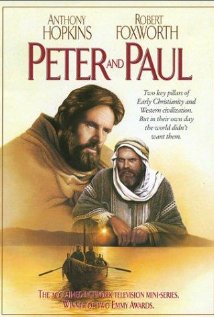
Peter and Paul is a television miniseries that originally aired on CBS in two 2-hour parts on April 12, 1981 and April 14, 1981. This biblical drama featured Anthony Hopkins as Paul of Tarsus and Robert Foxworth as Peter the Fisherman, David Gwillim as Mark and Jon Finch as Luke. It was directed by Robert Day. The historically-based miniseries covers much of the Book of Acts in its Biblical re-telling of chapters 8 through 28, including the apostolic missionary journeys and interactions of Peter and Paul.
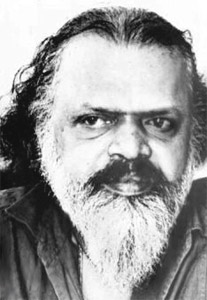
Govindan Aravindan was an Indian film director, screenwriter, musician, cartoonist, and painter. He was one of the pioneers of parallel cinema in Malayalam. He was known for his unorthodox way of filmmaking; he changed his cinematic forms consistently and experimented in storytelling without regular narrative styles.

Mitr, My Friend is a 2002 Indian English-language drama film directed by Revathi in her directorial debut, and written by V. Priya and Sudha Kongara. The film stars Shobana, Nasir Abdullah and Preeti Vissa. Set partly in India and the US, the film was also noted for having an all-woman crew. The movie won the Best English Film of the year award at the 49th National Film Awards. The movie also won Best Actress and Best Editor awards for Shobhana and Beena Paul respectively at the same function. Revathi received the "Special Jury Award: Silver Peacock" at the 33rd International Film Festival of India. The film also contains Tamil dialogues while most of the songs are in Hindi.
Sivappathigaram is a 2006 Indian Tamil-language political action film written and directed by Karu Pazhaniappan. The film stars Vishal and Mamta Mohandas, while Raghuvaran, Manivannan, Upendra Limaye, Rajan P. Dev, and Ganja Karuppu play supporting roles. The film marks Mamta Mohandas's Tamil debut. The film's score and soundtrack are composed by Vidyasagar, while S. Gopinath handled the cinematography and Suresh Urs handled the editing. The film's climax was shot during the Annual Azhagar festival in Madurai. The film released on 24 November 2006.
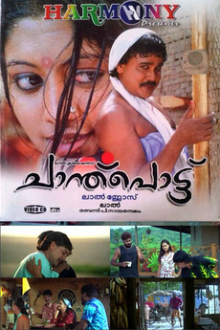
Chanthupottu is a 2005 Indian Malayalam-language romantic comedy-drama film directed by Lal Jose, written by Benny P. Nayarambalam, and produced by Lal. The film was based on a play of the same name, which in turn, was based on the life of an actual man with feminine mannerisms. The story is about a man named Radhakrishnan (Dileep) who was brought up like a girl by his grandmother. This film was a commercial success at the box office.

Zindagi (transl. Life) is a 1964 Indian Hindi-language film produced by S. S. Vasan, Gemini Pictures and directed by Ramanand Sagar. The film stars Rajendra Kumar, Vyjayanthimala, Raaj Kumar, Prithviraj Kapoor, Mehmood, Jayant, Jeevan, Leela Chitnis and Helen. The film's music is by Shankar Jaikishan. The film was remade in Tamil as Vaazhkai Padagu (1965) and in Telugu as Aada Brathuku (1965).

George Varghese Kakkanadan, commonly known as Kakkanadan, was an Indian short-story writer and novelist in the Malayalam language. His works broke away from the neo-realism that dominated Malayalam literature through the 1950s and 1960s. He is often credited with laying the foundation of modernism in Malayalam literature. He is a recipient of Kendra Sahitya Akademi Award and Kerala Sahitya Akademi Awards in addition to numerous other awards and recognitions.
Black Cat is a 2007 Indian Malayalam-language action thriller film written and directed by Vinayan and starring Suresh Gopi, Meena, Mukesh, Karthika, Rajan P Dev, Indrans, Harisree Ashokan, Jagadeesh, Nedumudi Venu, Ashish Vidhyarthi and Thilakan.

Naraka is the realm of existence in Jain cosmology characterized by great suffering. Naraka is usually translated into English as "hell" or "purgatory".
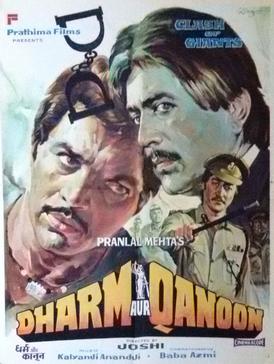
Dharm Aur Qanoon is a 1984 crime thriller film starring Dharmendra, Rajesh Khanna, Vinod Mehra, Asha Parekh, Jaya Prada, Supriya Pathak, Danny Denzongpa, Om Shivpuri, Iftekhar, Manmohan Krishna in pivotal roles. It had box office collection of 6.5 crores in 1984 and the film was a commercial hit at the Indian box-office and was critically acclaimed. Dharm Aur Qanoon was the remake of director Joshiy's Malayalam movie Aarambham released on 1 September 1982. Aarambham was the top grosser movie in Malayalam industry in 1982 with an ensemble cast. The film was remade in Tamil that same year as Ezhuthatha Sattangal directed by K. Shankar.
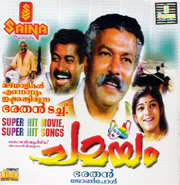
Chamayam is a 1993 Indian Malayalam-language drama film directed by Bharathan and written by John Paul, starring Manoj K. Jayan, Murali and Sithara in the lead roles. The film is about the lives of two fishermen who are also stage actors.
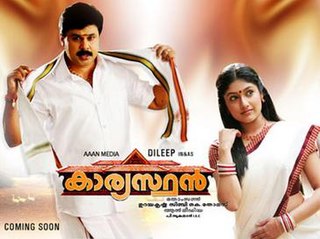
Kaaryasthan is a 2010 Malayalam-language action comedy film written by the duo Udayakrishna-Siby K. Thomas and directed by debutant Thomson K. Thomas. It stars Dileep, Siddique, Madhu and Suraj Venjaramoodu. It was Dileep's 100th feature film. Akhila, a noted television anchor and dancer, debuted as an actress through this film. The film is an unofficial remake of 2000 Telugu film Kalisundam Raa with minor changes in the plot. In the film, Krishnanunni tries to settle the dispute between two feuding families. In the process of doing so, he ends up falling in love with Sreebala, who belongs to one of the families.

Chemmeen is a Malayalam novel written by Thakazhi Sivasankara Pillai in 1956. Chemmeen tells the story of the relationship between Karuthamma, the daughter of a Hindu fisherman, and Pareekutti, the son of a Muslim fish wholesaler.

Kanchana Sita is a 1977 Indian Malayalam feature-length film scripted and directed by G. Aravindan. A mythological film, its story was adapted from C. N. Sreekantan Nair's play of the same name, which is a reworking of Valmiki's Ramayana.
Oridathu (1987) is an Indian Malayalam satirical drama film written and directed by G. Aravindan. Nedumudi Venu, Sreenivasan, Thilakan, Vineeth, Krishnankutty Nair, Chandran Nair and Soorya form the cast. The story is about the problems faced by the people of a hamlet where electricity is unavailable when electric supply finally reaches there. The film reaches the conclusion that life is better without electricity. The indefinability of the human mind is the theme of the film. Though the film is discussing a serious issue, the treatment of it is very simplistic. Humour and intensity characterise the film that is set in the mid-fifties. The film is different from many of Aravindan's earlier works in that it deals with a broad range of characters and lacks a clear-cut linear story. It became a major critical success and earned the best director awards for Aravindan at the state and national film awards.
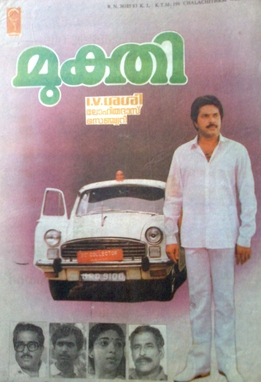
Mukthi is a 1988 Indian Malayalam film, directed by I. V. Sasi and produced by Raju Mathew. The film stars Mammootty, Shobhana, Urvashi and Thilakan in the lead roles.
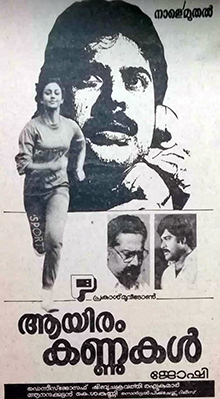
Aayiram Kannukal is a 1986 Indian Malayalam-language film, directed by Joshiy and produced by Rajan Prakash. The film stars Mammootty, Ratheesh, Shobhana, Jose Prakash and Rajalakshmi in lead roles. The film had musical score by Raghu Kumar. The film was loosely based on the 1984 Tamil film Nooravathu Naal. The film was a box office failure. The film has however attained a cult status in the years following its release.
Doorathu Idi Muzhakkam is a 1980 Indian Tamil-language drama film produced and directed by K. Vijayan and written by T. Somasoodan. Starring debutante Poornima and Vijayakanth, it has Peeli Sivam, and Suruli Rajan in other prominent roles. Set in the backdrop of a fishing community, the film tells the story of a woman who is torn between her love and husband. The film was screened at the Indian Panorama of the International Film Festival of India in 1981.
Isaac Thomas Kottukapally was an Indian film score composer, music director and script writer working mainly in Malayalam, Kannada and Hindi films. He scored music for several English documentaries and commercials.















